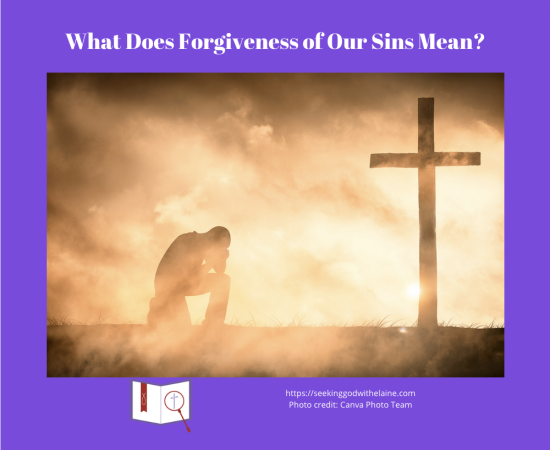Redemption and forgiveness of sin are both mentioned in Ephesians 1: 7. This daily devotional looks at forgiveness of our sins. It also considers how both concepts are related.
Nuggets
- Forgiveness is when we give up the bitterness and resentment that we feel because we have been wronged.
- Sin is a conscious or unconscious act where we disobey God and break one of His laws and commandments.
- Jesus, our Redeemer, died on the cross so that all sins save one could be forgiven.
To read devotions in the Forgiveness of Sins through Grace by Redemption series, click the appropriate button below.
Devotions in the The Letter of Paul to the Ephesians series

We had a devotion on forgiveness a while back. It focused more on you and I forgiving each other, not the forgiveness of our sins.
To read a related devotion, click the button below.
Still, the definition of forgiveness can jump start us here.
Let's Put It into Context
Here is a running list of nuggets for the series.
What Is Forgiveness?
“In him we have redemption through his blood, the forgiveness of sins, in accordance with the riches of God's grace” (Eph. 1: 7 NIV).
Forgiveness is when we give up the bitterness and resentment that we feel because we have been wronged.
We forgive someone when we make a conscious decision to not seek vengeance.
That is us forgiving someone else for their wrong. It really doesn’t talk about someone forgiving us when we have done the wrong.
I think this works a little better.
Forgiveness is, when we ask, the act of God pardoning us because we have shown repentance for breaking His laws and commandments, which allows us to become holy as He is.
- Repentance is acknowledging our separation from God and expressing sorrow for breaking God’s laws and commandments by making the commitment to changing ourselves through obedience so that we no longer do the wrong things.
- Obedience means submitting ourselves to the will of God as it is presented to us and living our lives accordingly.
- Holy means to be set apart — because of our devotion to God — to become perfect, and morally pure while possessing all virtues.
- Perfection means we reach a state of maturity because the combination of the spiritual graces form, when all are present, spiritual wholeness or completeness — holy, sanctified, and righteous.
- Spiritual graces are worldly morals that have been submitted to God to further His kingdom instead of enhancing this world.
- Sanctified means to be set free from sin.
- Righteous means we are free from sin because we are following God’s moral laws.
- Perfection means we reach a state of maturity because the combination of the spiritual graces form, when all are present, spiritual wholeness or completeness — holy, sanctified, and righteous.
- Pure means not being sinful or having the stain of sin.
- Virtues are standards of moral excellence.
Glossary
We accept the pardon by letting go of the guilt and remorse that we feel because we have done something wrong. It is a conscious decision to accept His forgiveness.
This forgiveness does take two players. God has to do the forgiving because, ultimately no matter what we have done, we have sinned against God. We have to show remorse and change our lifestyle to live as He would have us live.
How Does That Apply to Sin?
Sin is a conscious or unconscious act where we disobey God and break one of His laws and commandments.
Sin is not believing that Jesus is our Savior to save us from our actions by humans that disobey God and break one of His reasonable, holy, and righteous laws and commandments, goes against a purpose He has for us, or follows Satan’s promptings.
Glossary
All the sins we have committed will be pardoned and removed when we confess them to God. We have to consciously seek God and confess.
Jesus, our Redeemer, died on the cross so that all sins except the unpardonable sin could be forgiven. All of the sins committed from Adam to today can be forgiven. All the sins that we will commit from tomorrow to the second that Jesus returns can be forgiven. All we have to do is repent and ask for forgiveness.
Yes, Jesus paid a high price so that our sins could be forgiven. To us, the forgiveness is free.
We don’t have to fix ourselves before we can ask for this forgiveness. We don’t have to worry hat we have committed a sin He cannot forgive.
See, God doesn’t forgive us based on anything we have or haven’t done. God forgives us based on His love for us.
When God forgives us, we stand before God unblemished. What that means is the scarring that the sin created has been removed.
We have to do the accepting and get over it. If we feel a lot of guilt even after we have confessed the sin, that could mean that we don’t think that God can forgive that particular sin. He can and will when we genuinely ask for forgiveness and intend to stop committing the sin.
What One Sin Will God Not Forgive?
“Therefore I tell you, every sin and blasphemy will be forgiven men, but the blasphemy against the Spirit will not be forgiven. And whoever says a word against the Son of man will be forgiven; but whoever speaks against the Holy Spirit will not be forgiven, either in this age or in the age to come” (Mt. 12: 31-32 RSV).
Matthew 12: 31-32 talks about only one unpardonable sin – rejecting the witness of the Holy Spirit. We choose whether or not to listen to the promptings of the Holy Spirit as He convicts us and shows us of our need for the Savior. We choose God by listening to those promptings and admitting we are sinners, believing Jesus’ death was God’s gift to make salvation available to us, and confessing that God is now our Lord of lords and King of kings.
The ABCDs of Salvation
If you have not become a believer in Christ, please read through the
Plan of Salvation and prayerfully consider what God is asking you to do.
A – admit our sins
B – believe His Son Jesus is our Redeemer
C – confess God as Sovereign Lord
D – demonstrate that commitment by making any changes needed in our lives to live the way in which God has called us
The Disciple’s Job Description
I used to think that this meant that we refused to believe the Holy Spirit’s prompting regarding salvation. Now, I think it is more than that.
We can quench the Holy Spirit in more ways than one. While refusing to believe in Jesus as our Savior and Redeemer is a biggy, I think that we can quench the Holy Spirit when we haven’t submitted our lives to God.
One example of this is when we really aren’t genuine in our repentance at salvation.
Salvation is the gift of life through the deliverance from condemnation and sin to acceptance and holiness and changes us from being spiritually dead to spiritually alive.
- Spiritual death is the spiritual separation from God that occurred as a consequence of Adam and Eve’s original sin.
- The spiritually alive are those who have ABCDed, so they are no longer separated from God.
Glossary
God requires that we totally give Him control of our lives. If we don’t, our salvation experience really isn’t genuine.
No, we aren’t going to never sin again. We are talking attitude here. Have we truly repented and turned from our sinful ways to try to follow God’s Will?
What Does Redemption Have to Do with Forgiveness?
We said in the last devotion that redemption is where something is used in exchange for something else to gain or regain something. Through Jesus’ blood, we have redemption of our sins. That allows us to receive forgiveness.
We said forgiveness is when God pardons us because we have broken His laws and commandments. We accept the pardon by letting go of the guilt and remorse that we feel because we have done something wrong. It is a conscious decision to accept His forgiveness.
This is not a chicken and egg situation. The redemption had to come first. The payment for our sins had to happen before the forgiveness happens.

Making the Connections
Is forgiveness of sin separate or a byproduct of redemption? You cannot have the forgiveness without the redemption. Even though we have the redemption, we have to continue to ask for forgiveness because we continue to sin.
Once we have confessed a sin and received forgiveness, we don’t have to have forgiveness for that sin again — unless we commit it again.
How Do We Apply This?
We have to listen to the promptings of the Holy Spirit. We have to accept God’s gift of salvation.
If you have not admitted that your relationship is not right with God,
have not asked Jesus to be your Lord and Savior,
have not confessed your sins, and
are not demonstrating that by a changed lifestyle,
please read through the Plan of Salvation and prayerfully consider what God is asking you to do.
Loving Heavenly Father. We are humbled that You love us enough to send Your Son to be our Redeemer. You love us enough to forgive us of our sins. You want to have a relationship with us and have put the plan into place “… before the foundation of the world …” (Eph. 1: 4). Lord, we admit that we are sinners. We believe Jesus is our Savior and Redeemer. We confess and place our lives under Your control. Help us to live for You. Amen.
What do you think?
Leave me a comment below (about this or anything else) or head over to my Facebook group for some interactive discussion.
If you don’t understand something and would like further clarification, please contact me.
If you have not signed up for the email daily or weekly providing the link to the devotions and the newsletter, do so below.
If God has used this devotion to speak with you, consider sharing it on social media.
Elaine, your explanation of the unpardonable sin is the best I’ve heard, read. Very nice!
Thank you! That is a difficult concept to get. It took many years to figure it out.
Pingback: How Are Grace, Redemption, and Forgiveness Connected? – Seeking God with Elaine
Pingback: What is the Spirit of Wisdom? – Seeking God with Elaine
Pingback: God’s Wrath and Mercy – Seeking God with Elaine
Pingback: Does God Come Looking for Us? – Seeking God with Elaine
Pingback: What Is Sin? – Seeking God with Elaine
Pingback: How Do Disciples Crave Righteousness? – Seeking God with Elaine
Pingback: How Does Longsuffering Help Consistency? – Seeking God with Elaine
Pingback: Can God See Us If We Are Sinners? – Seeking God with Elaine
Pingback: Does God Really Forgive and Forget Sin? – Seeking God with Elaine
Pingback: What Was John the Baptist’s Message? – Seeking God with Elaine